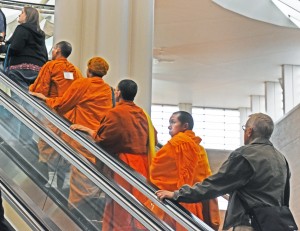It’s been a little over a week since the Supreme Court of the United States (SCOTUS) made its decision in the so-called Hobby Lobby case which determined that closely-held corporations shall be afforded similar accommodations as religious non-profits with respect to the contraceptive mandate in the Patient Protection and Affordable Care Act (aka Obamacare). It should be stated that I disagree fully with this ruling but I sympathize with the basis of the argument, that the Green family, the owners of Hobby Lobby, felt that their rights had been trampled by the mandate.
I sympathize with that view (though I don’t share it) because I recognize that it stems from the fear that an authority — in this case the government — may force someone or something (while personhood may begin at incorporation, it’s certainly not biological) to ignore or compromise their sincerely held beliefs. I don’t want that for anyone, anywhere, at anytime.
The struggle, for me, is trying to understand how the contraceptive mandate could possibly be understood to infringe on the rights of business owners. But while I’m having trouble seeing that point of view, what’s truly chilling about this decision is that it has created the framework for judicial review of what someone believes and how that belief interacts with law.
Self-Censorship
Wikipedia has a great definition for self-censorship:
Self-censorship is the act of censoring or classifying one’s own work (blog, book(s), film(s), or other means of expression), out of fear of, or deference to, the sensibilities of others, without overt pressure from any specific party or institution of authority.
I am a self-censor. All the time. Heck, this post is a few days late because I keep writing and rewriting it in my head, desperately trying to find the words that are “just right.” I frequently make comments on Facebook and on other blogs that I delete before posting because I’m worried that they don’t add to or advance the conversation. Or, commonly, that they’ll reflect poorly on me and my reputation may suffer for it.
Self-censorship is almost universally considered a problem for the same reason that censorship of any sort is– it reduces a conversation to the least-risky, least-potentially-problematic points of view which, in the end, benefits no one. Despite understanding this, it’s hard to stick your neck out and take a stand.
But, here’s the thing about self-censorship: I choose it. I may do so out of fear of being misunderstood or causing offense, but it’s still my choice to remain silent, to not-act, rather than being an imposition from some other authority.
The Chills
What gives me the chills about the Hobby Lobby decision is that now the judiciary could be seen to be an authority over the validity of one’s religious choices and resulting behaviors. The Hobby Lobby case has shown the way for believers, religious and otherwise, to describe their argument in the courts if they seek to redress a grievance of some sort. In this case, that search bore fruit and a religiously-based point of view was protected. But, I doubt that all such points of view will be similarly protected–and frankly they probably shouldn’t.
And the fact that courts have been asked to determine which beliefs should and should not be protected gives me the shivers.
Clearly, there are beliefs that, in the modern world, are never going to be protected. If someone were to practice religiously-motivated human sacrifice, for example, it’s unlikely that religious freedom would be the basis on which a court defense would be crafted (hint: insanity). But, let’s make it less extreme: the ritual slaughter of animals. And, by this I don’t necessarily mean simply ritualized animal sacrifice, but also the specific means by which an animal must be slaughtered in order to be considered kosher or halal. Would the Hobby Lobby framework enable a Jewish or Muslim business owner to restrict not only their own diet, but the diet of their employees? Similarly, could a Jain employer simply outlaw all foods at their place of business that don’t adhere to their religiously-motivated dietary restrictions? I suspect the answer would be no and my guess is that some Jews, Muslims, and Jains might have a problem with that.
To me, the Hobby Lobby case did not protect the Green family’s religious freedoms because those freedoms weren’t in any danger. No one was asking Mr. Green to reach into his own wallet and pull out the money necessary to cover an employee’s IUD. Instead, what the court was asked to review was the Green family’s right to express their religion in a way that imposes that belief on others: women who might be interested in the four types of contraception objectionable to the Greens. It determined that your employer’s religious beliefs trump your own personal beliefs, religious or otherwise, regardless of what they may be.
Worse, it was specifically mentioned that this SCOTUS ruling only applied to contraception; procedures like blood transfusions, to which Jehovah’s Witnesses object on religious grounds, would still be covered. Thus, in an attempt to protect the perceived religious rights of one group (the Greens and those who share their beliefs) the court quite literally told another group that their religiously-motivated objection to a common form of health care would need to be adjudicated separately. How did this make Jehovah’s Witnesses feel? Not well, I suspect.
Ch-ch-ch-ch-changes…
I think it’s inevitable that someone will use this case as the basis for another situation in which the religion of an authority figure–like an employer–conflicts with the expectations of those over which they have authority. Like in my examples above, I think it’s also inevitable that not all of these cases will go the way of the believers.
How will this change the actions of communities of faith and philosophy? Part of why I self-censor is because I worry–probably overly much–about how I might be perceived by those that I respect. If, like me, a religious or non-religious individual that finds themselves in conflict with a law is similarly concerned, might that concern lead them to change their actions or, to put it in the terms popularized by the Hobby Lobby supporters, to violate on their previously inviolable beliefs?
Or, even more insidious, would facing this sort of judgement keep certain forms of religious expression behind closed doors, hidden from the limelight and the court’s attention? Misunderstood religious and non-religious communities continue to travel a more difficult road than mainstream ones. If driven to hide their beliefs and their activities, it’s likely that these roads will become more difficult.
These are the things that have been keeping me up at night; well, these and the obvious (to me) insult to women in specific and employees in general. I worry that the eventual result of the SCOTUS decision in favor of Hobby Lobby will mean less religious freedom for us all, though probably even less of it for those faith and philosophical communities that remain largely misunderstood within American culture.















